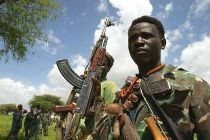Darfur rebel groups threaten not to resume peace talks
ASMARA, Mar 15, 2005 (IRIN) — The two main rebel groups in the conflict-affected western Sudanese region of Darfur have said they will not resume talks with the Khartoum government unless “war criminals” in the region are prosecuted.
 In a statement issued from the Eritrean capital, Asmara, on Thursday, the Justice and Equality Movement (JEM) and the Sudan Liberation Movement/Army (SLM/A) said that justice was a precondition for peace in Darfur.
In a statement issued from the Eritrean capital, Asmara, on Thursday, the Justice and Equality Movement (JEM) and the Sudan Liberation Movement/Army (SLM/A) said that justice was a precondition for peace in Darfur.
They also demanded the removal of African Union (AU) peace monitors from Darfur, saying they were no longer “impartial”. According to the rebels, the UN, the European Union and Eritrea should conduct monitoring activities.
“The two movements view the issue of trial of the perpetrators as the foremost priority in resolving the conflict in Darfur, especially after they have been named,” the rebels said. “The two [have] resolved to resume the negotiations only after the apprehension and trial of the criminals in an international court or tribunal.”
However, the Sudanese state minister for foreign affairs, Najib Al-Khair Abdul-Wahab, described the demand by the JEM as “a maneuver and attempt to weaken the African role”.
The minister, in a statement issued through the official Sudanese News Agency, said, “the responsibility for the solution of Darfur problems will be the task of Africa, adding that any attempt to weaken that role is regarded as a violation of the African consensus”.
Talks between the two groups and the government have taken place intermittently in the Nigerian capital, Abuja, since August. President Olusegun Obasanjo, as chairman of the AU, has personally played a leading role as a mediator.
However, the talks have made little progress and the latest round ended in stalemate in December. Diplomats said the SLM/A had appeared willing to resume talks with Khartoum, but the JEM had questioned the AU’s continued role as a mediator, accusing its officials of a pro-Khartoum bias.
Recently, the Special Representative of the UN Secretary-General for Sudan, Jan Pronk, visited Asmara for talks with government and Darfur rebel representatives in yet another bid to kick-start the Abuja negotiations.
The UN has described the Darfur situation as the world’s worst humanitarian crisis. It estimates that 2.4 million people in the region are dependant on aid for survival.
A recent UN report on atrocities in Darfur concluded that while horrific war crimes had taken place, which merited referral to the International Court of Justice, they did not amount to genocide.
In their statement, the two rebel groups appealed to “outside mediators” to take over from the AU, saying the pan-African body had lost all credibility in the region and was no longer seen as impartial.
“This is a human right,” Khalil Ibrahim, JEM president, told reporters in Asmara after issuing the statement. “Is it wrong that we say this mediator [the AU] is not going to bring peace in Sudan – please find us another mediator?”
Obasanjo, in a statement issued by his spokesman in Abuja on 8 March, said the AU was still seeking an acceptable means of bringing Darfur violators to justice and had not taken a final decision on the issue.
“President Obasanjo wishes to state that no consensus has been reached in the AU with the government of Sudan on the matter and there has been no agreement with the United Nations Security Council on it,” the statement said.
“Although President Obasanjo had consultations on the issue of Darfur with President Mohammed El-Bashir and First Vice President el-Hajj Uthman Mohammed Taha [of Sudan] in Abuja recently, nothing has so far been agreed and the AU’s search for an acceptable arrangement to bring the culprits to justice goes on,” it added. “When a position is adopted, it would be harmonised with the views of the UN Security Council.”
The AU currently has a monitoring force numbering about 1,942 troops out of an original target of 4,000. The UN, in a report released on Friday, hailed the success of the AU contingent in the area around Labado in South Darfur.
Prior to the AU deployment, UN Secretary-General Kofi Annan said in the report, the area had suffered some of the worst fighting in recent months. However, the AU troops’ presence had had a calming effect, which led to the return of some internally displaced persons.
“A fully staffed and effective AMIS [African Union Mission in the Sudan] will increase the chances that serious clashes can be prevented or minimised,” Annan said, calling on the international community to strengthen the AU force in Darfur.
